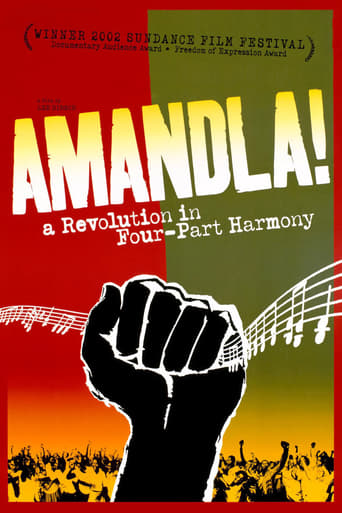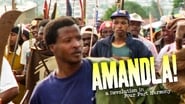bluheron1
I know this is a minority opinion, and I think if I was South African I would have been very moved by the film. But I just did not understand the issues well enough or know the history and weight of the people interviewed, except for Miriam Mekeba and Hugh Masekela. The film would have worked better for me if it had provided more background and focus for an uninformed American. It certainly never answered the first question I had: how can an entire nation sing so beautifully in four-part harmony? It must have seemed so normal to the filmmakers that they never even noticed that question. But for me, in a world where very few non-professional people know how to sing harmony, it's a stumper.
Lee Eisenberg
Sometimes, we seem to forget that apartheid was only eliminated in 1994. "Amandla! A Revolution In Four Part Harmony" tells of how the black South Africans used music to help them overcome the Draconian oppression installed by the white population. Naturally, we get to hear from Nelson Mandela, Winnie Mandela, and Miriam Makeba, but also from ordinary people, and how they individually used music. One of the most chilling scenes was the footage of Hendrik Verwoerd, who was prime minister of South Africa from 1958 until his assassination in 1966. He said in the interview something to the effect of: "People have misunderstood apartheid. It's really a policy of good-neighborliness." As you might imagine, the black population had plenty to say (and sing) about him.I actually used this documentary as one of the sources in a paper that I wrote for an assignment in German class in Lewis & Clark College in spring, 2004. I had watched the documentary in a class called Introduction to World Music. In the German class, we were talking about various aspects of the Third Reich. I explained in the paper that apartheid's policies were basically the same as the Third Reich. I made double sure to cite the interview with Hendrik Verwoerd to show just how vile these people were.
icelandreliant
The remaining problems of AIDS and poverty in South Africa often overshadow the miracle that happened in the 1990's. This documentary shows you a different side of the story. Musicians of all kinds are shown, with interesting interviews and performances that are moving. I appreciated the way the filmmakers show a considerable amount of music but mix it in with personal narratives. It is fascinating to look at a time period that seems completely past but was so recent that all the involved parties are still alive. Even apartheid era police are interviewed. The musicians also range from charming older women speaking of decades ago to very popular musicians known worldwide. The film does seem to be a bit disorganized at times but it never loses your interest. Other movies about apartheid include Cry Freedom and Cry, the Beloved Country. For DMB fans, there is an interview of Dave Matthews on the DVD as he helped finance this movie.
Swangirl
"Amandla! A Revolution in Four-Part Harmony" is a documentary that is riveting and educational, uplifting and heartbreaking. The contrasts are all laid bare in this project, making it a worthwhile film to watch.The focal point of the documentary is the role music played in the lives of South Africans as they endured and overcame the Apartheid movement. Director Leon Hirsch interviews a number of singers, composers, DJs and freedom fighters, young and old. He follows the history of Apartheid by tracing the music that came out of the struggle and what happened to those who created it.I think what grabbed me was how much of a role music plays in great periods of change. It was also a driving force of African-Americans in the U.S. who were fighting segregation during the 60s. The spirituals that buoyed them share a similar history to those songs sung in South Africa.The music chosen was a wonderful collection I want to hear again. I also enjoyed seeing the laughter of many of the singers as they looked at old photographs, remembering younger days.I also liked that Hirsch interviewed a white freedom fighter who was sent to Pretoria prison for several years. His interviews with the white Afrikkaners who formerly worked as riot police and jailers are chilling but necessary.
My hope is that more Americans will see this film so they fully realize the scope of Apartheid in South Africa and what a triumph it was to see it overturned. Was it really 1994 when black South Africans were finally allowed to vote? It breaks my heart.As a teenager in the 80s, I knew hardly anything about Apartheid. This film did a good job in changing that.




